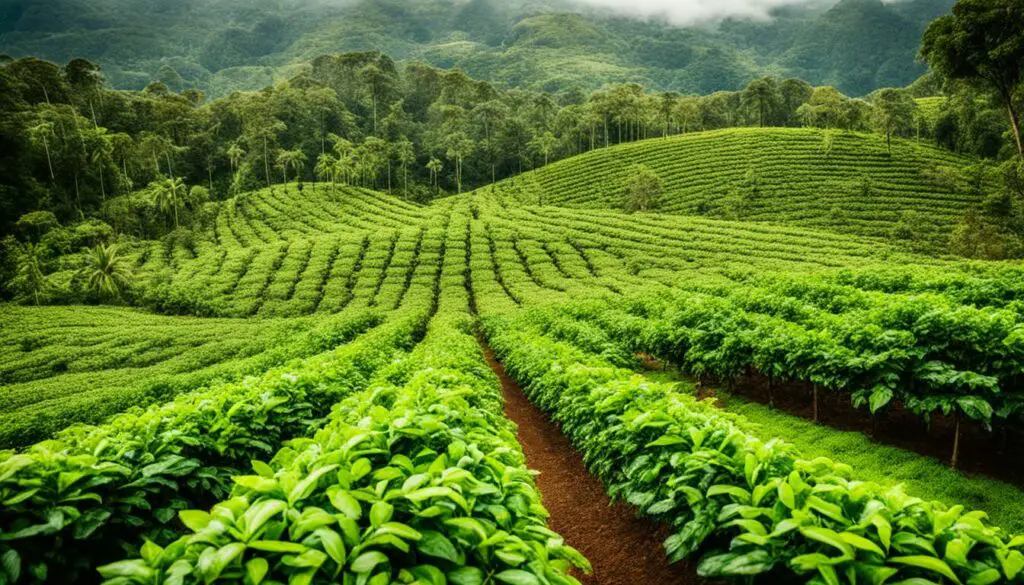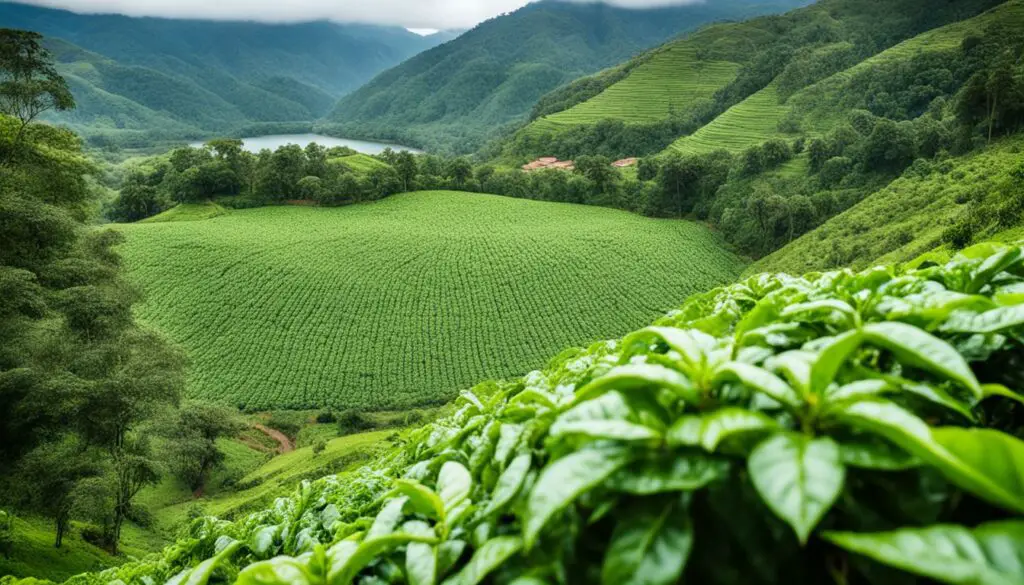My visit to a small coffee farm in Costa Rica opened my eyes to the world of organic coffee. Maria, the farmer, showed me coffee plants under the shade of towering trees. She explained how her organic methods protected the ecosystem and produced flavorful beans. This experience made me realize my daily coffee could impact the planet positively.
Further research into sustainable agriculture and eco-friendly farming revealed the extensive environmental benefits of organic coffee. These practices not only preserve soil health but also protect wildlife habitats. They are paving the way for a sustainable future for coffee enthusiasts globally.
Let’s delve into the realm of organic coffee and discover its positive environmental impact. You might be astonished by the significant benefits your morning coffee can bring to the environment.
The Rise of Organic Coffee: A Global Perspective
Coffee has transcended its origins to become a global staple, rivaled only by water in its far-reaching impact. The evolution of organic coffee from traditional to modern farming methods is nothing short of remarkable. This transformation has been driven by a growing awareness of the need for sustainable practices.
Coffee’s Global Impact
Coffee’s influence is profound, touching economies and cultures across the globe. Its widespread popularity has triggered a shift in how it is cultivated. This shift is crucial for preserving soil health and biodiversity.
From Traditional to Modern Farming
Historically, coffee was cultivated under the canopy of larger trees in Africa, utilizing sustainable methods. Farmers employed techniques like composting and crop rotation. However, the 1970s marked a significant departure from these practices. Technified agriculture emerged, leading to widespread deforestation and the adoption of sun cultivation.
Organic Coffee Certification
The USDA intervened in the 1990s to establish and enforce organic farming standards. This ensured that organic coffee production eschews synthetic pesticides and genetically modified organisms. The certification process upholds rigorous standards, contributing to a lower carbon footprint in coffee production.
| Traditional Farming | Modern Organic Farming |
|---|---|
| Shade-grown | Balanced sun exposure |
| Natural pest control | Organic pest management |
| Limited yield | Sustainable high yield |
The ascendancy of organic coffee mirrors a heightened environmental consciousness. It represents a pivotal shift towards sustainable agriculture, emphasizing soil health and ecological equilibrium.
What Makes Coffee Organic?
I’ve often pondered the distinction between organic and regular coffee. Delving into the subject, I found that organic coffee adheres to strict USDA guidelines. These beans are cultivated sans pesticides, relying on natural fertilizers such as compost and manure.
At the core of organic coffee farming lies ethical sourcing. Farmers emphasize biodiversity and sustainability, fostering a symbiotic relationship with nature. They eschew synthetic insecticides, herbicides, and fungicides, favoring natural deterrents like neem oil to safeguard their crops.
Organic coffee production frequently aligns with fair trade principles. This guarantees that farmers are fairly compensated for their efforts and commitment to sustainable agriculture. The USDA organic logo on your coffee bag signifies adherence to these stringent standards.
- Grown without synthetic pesticides or fertilizers
- Promotes biodiversity and soil health
- Supports sustainable farming practices
- Often associated with fair trade initiatives
Opting for organic coffee transcends mere enjoyment of a tasty beverage. It champions a system that prioritizes environmental stewardship, the welfare of farmers, and the coffee industry’s long-term viability.
Traditional vs. Modern Coffee Farming Techniques
Coffee farming has undergone significant changes, with traditional and modern methods influencing the industry. These techniques affect our environment and the quality of coffee. Let’s delve into the differences and their implications for sustainable agriculture.
Shade-Grown Coffee: Nature’s Way
Shade-grown coffee replicates the natural environment of forests. This method combines coffee plants with other trees and crops. It fosters biodiversity, supports wildlife, and improves soil health. Shade trees serve as natural fertilizers, minimizing the need for synthetic inputs.

Sun Cultivation: The Modern Approach
Sun cultivation began in the 1970s to enhance yields. This approach removes shade trees, exposing coffee plants to full sunlight. Although it increases production, it often necessitates more water and chemical inputs. The absence of natural pest control results in elevated pesticide use, negatively impacting water conservation.
Impact on Biodiversity and Soil Health
The transition from shade to sun cultivation has profound environmental effects. Shade-grown coffee sustains diverse ecosystems, whereas sun-grown methods can degrade soil and destroy habitats. Adopting sustainable agriculture is essential for maintaining soil fertility and preserving local biodiversity.
| Aspect | Shade-Grown Coffee | Sun Cultivation |
|---|---|---|
| Biodiversity | High | Low |
| Water Usage | Lower | Higher |
| Soil Health | Better | Poorer |
| Chemical Inputs | Minimal | Extensive |
Environmental Benefits of Organic Coffee
Organic coffee farming brings numerous environmental benefits. These practices are essential for a healthier planet. Let’s delve into how organic coffee cultivation benefits our environment.
Soil Conservation and Fertility
Organic coffee farms focus on soil health. They employ natural fertilizers and crop rotation, which enrich soil structure and fertility. This method minimizes erosion and ensures nutrient-rich soil for future crops. Organic coffee’s high antioxidant content not only benefits us but also reflects healthy soil.
Water Resource Protection
Organic coffee farms eschew synthetic chemicals, thus safeguarding water resources. No harmful runoff contaminates nearby streams or groundwater. This sustainable method protects local ecosystems and drinking water sources.

Preservation of Wildlife Habitats
Organic coffee often thrives under shade, creating a sanctuary for wildlife. This approach supports biodiversity, offering homes for birds, insects, and mammals. It contrasts sharply with sun-grown coffee, which often leads to deforestation.
| Aspect | Organic Coffee | Conventional Coffee |
|---|---|---|
| Soil Health | Natural fertilizers, improved structure | Chemical fertilizers, potential degradation |
| Water Quality | No chemical runoff | Potential contamination from pesticides |
| Wildlife Impact | Supports diverse habitats | Often leads to habitat loss |
| Carbon Footprint | Reduced due to sustainable practices | Higher due to intensive farming methods |
Opting for organic coffee aids in biodiversity preservation and reduces the carbon footprint. It’s a straightforward way to positively impact the environment with every cup.
Organic Coffee and Climate Change Mitigation
Organic coffee farming is key in fighting climate change. It uses sustainable agriculture, reducing the carbon footprint. These methods boost biodiversity and keep soil healthy, vital for Earth’s health.
Shade-grown organic coffee stands out for its climate benefits. It locks away carbon and shelters various plants and animals. This shows how a simple coffee can positively affect our planet.
Organic coffee farming also means no synthetic fertilizers or pesticides. This reduces emissions from these chemicals. By picking organic coffee, we back sustainable farming and fight climate change. It’s a crucial step towards a greener future.
FAQ
What is the primary difference between organic and non-organic coffee?
The key difference is in the chemicals used. Organic coffee farming uses natural substances like neem oil and copper sulfate for protection. This approach avoids synthetic pesticides, fertilizers, and genetically modified organisms (GMOs).
How does organic coffee farming contribute to soil conservation and fertility?
Organic farming relies on natural fertilization methods such as composting and crop rotation. These techniques help maintain soil health and fertility without synthetic chemicals.
Why is organic coffee farming better for water resources?
Organic farming avoids synthetic pesticides and fertilizers. This prevents chemical runoff, protecting water sources and aquatic ecosystems.
How does organic coffee farming preserve wildlife habitats?
Traditional shade-grown methods create a natural habitat for diverse plants and animals. The absence of harmful pesticides ensures a safe environment for wildlife.
What is the significance of the USDA Organic certification for coffee?
The USDA Organic logo confirms the coffee was grown without synthetic pesticides, fertilizers, or GMOs. It meets strict organic growth and supply chain standards.
How does organic coffee farming contribute to climate change mitigation?
Organic farming supports biodiversity, reduces chemical inputs, and maintains healthy soil. These actions help sequester carbon and decrease greenhouse gas emissions from synthetic inputs.












